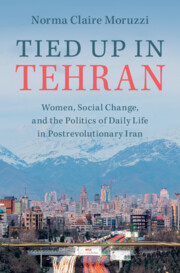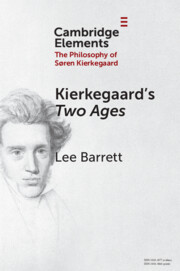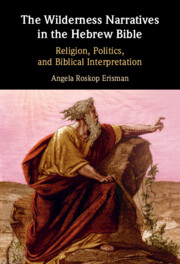Refine search
Actions for selected content:
120 results
12 - Coda: Thinking in Practice – Arendt, Foucault, and the Challenge of Freedom
-
- Book:
- Tied Up in Tehran
- Published online:
- 28 September 2025
- Print publication:
- 16 October 2025, pp 317-330
-
- Chapter
- Export citation

Understanding International Security
- Theory and Practice
- Coming soon
-
- Expected online publication date:
- October 2025
- Print publication:
- 30 October 2025
-
- Textbook
- Export citation
Political representation from the people’s perspective: the problem-solving principal–agent partnership
-
- Journal:
- European Journal of Political Research ,
- Published online by Cambridge University Press:
- 01 October 2025, pp. 1-21
-
- Article
-
- You have access
- Open access
- HTML
- Export citation

Tied Up in Tehran
- Women, Social Change, and the Politics of Daily Life in Postrevolutionary Iran
-
- Published online:
- 28 September 2025
- Print publication:
- 16 October 2025
Weighing responsibilities: the allocation of fair refugee quotas
-
- Journal:
- International Theory , First View
- Published online by Cambridge University Press:
- 15 September 2025, pp. 1-21
-
- Article
-
- You have access
- Open access
- HTML
- Export citation
Representation vs. Democracy? Presbyterianism in the Age of the French Revolution
-
- Journal:
- Church History , First View
- Published online by Cambridge University Press:
- 01 September 2025, pp. 1-27
-
- Article
-
- You have access
- Open access
- HTML
- Export citation

Kierkegaard's Two Ages
- A Literary Review
-
- Published online:
- 18 August 2025
- Print publication:
- 18 September 2025
-
- Element
- Export citation
2 - Courts and the Executive Branch
-
- Book:
- Courts and the Body Politic
- Published online:
- 25 July 2025
- Print publication:
- 14 August 2025, pp 37-72
-
- Chapter
- Export citation
1 - Activating the Criminal Law
- from Part I - Purpose
-
- Book:
- The Boundaries of Blame
- Published online:
- 26 July 2025
- Print publication:
- 14 August 2025, pp 9-46
-
- Chapter
-
- You have access
- HTML
- Export citation
From Past to Future
-
- Book:
- Democracy's Double Helix
- Published online:
- 09 September 2025
- Print publication:
- 14 August 2025, pp 288-306
-
- Chapter
- Export citation
Lifeboats and their problems: On the downsides of an influential metaphor in political theory
-
- Journal:
- Global Constitutionalism , First View
- Published online by Cambridge University Press:
- 25 July 2025, pp. 1-7
-
- Article
-
- You have access
- Open access
- HTML
- Export citation
2 - ‘A Lonely Furrow’
-
- Book:
- The Nehru Years
- Published online:
- 29 April 2025
- Print publication:
- 10 April 2025, pp 10-31
-
- Chapter
- Export citation
Negotiating racial subjection: analysing Black and Indigenous resistance from within colonial orders
-
- Journal:
- International Theory / Volume 17 / Issue 2 / July 2025
- Published online by Cambridge University Press:
- 07 March 2025, pp. 151-174
-
- Article
-
- You have access
- Open access
- HTML
- Export citation
8 - Return to the South, 2005–2011
-
- Book:
- New Sudans
- Published online:
- 06 February 2025
- Print publication:
- 13 February 2025, pp 288-304
-
- Chapter
- Export citation
Indigenous political theory, metaphysical revolt, and the decolonial rearticulation of political ordering
-
- Journal:
- International Theory / Volume 17 / Issue 1 / March 2025
- Published online by Cambridge University Press:
- 27 January 2025, pp. 92-117
-
- Article
-
- You have access
- Open access
- HTML
- Export citation
2 - Pluralizers and Anti-Pluralists
- from Part I - Theory
-
- Book:
- Contesting Pluralism(s)
- Published online:
- 19 December 2024
- Print publication:
- 02 January 2025, pp 30-58
-
- Chapter
- Export citation

The Wilderness Narratives in the Hebrew Bible
- Religion, Politics, and Biblical Interpretation
-
- Published online:
- 12 December 2024
- Print publication:
- 19 December 2024
Political, not (just) legal judgement: studying EU institutional balance
-
- Journal:
- European Law Open / Volume 3 / Issue 2 / June 2024
- Published online by Cambridge University Press:
- 09 December 2024, pp. 389-401
-
- Article
-
- You have access
- Open access
- HTML
- Export citation
Introduction
-
- Book:
- Bartolus of Sassoferrato
- Published online:
- 14 November 2024
- Print publication:
- 21 November 2024, pp xi-xxxvii
-
- Chapter
- Export citation
A Millian Case against Epistemic Arguments for Federalism
-
- Article
-
- You have access
- Open access
- HTML
- Export citation
